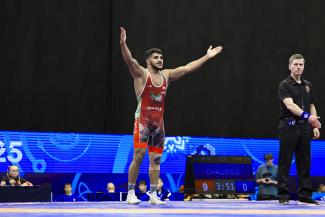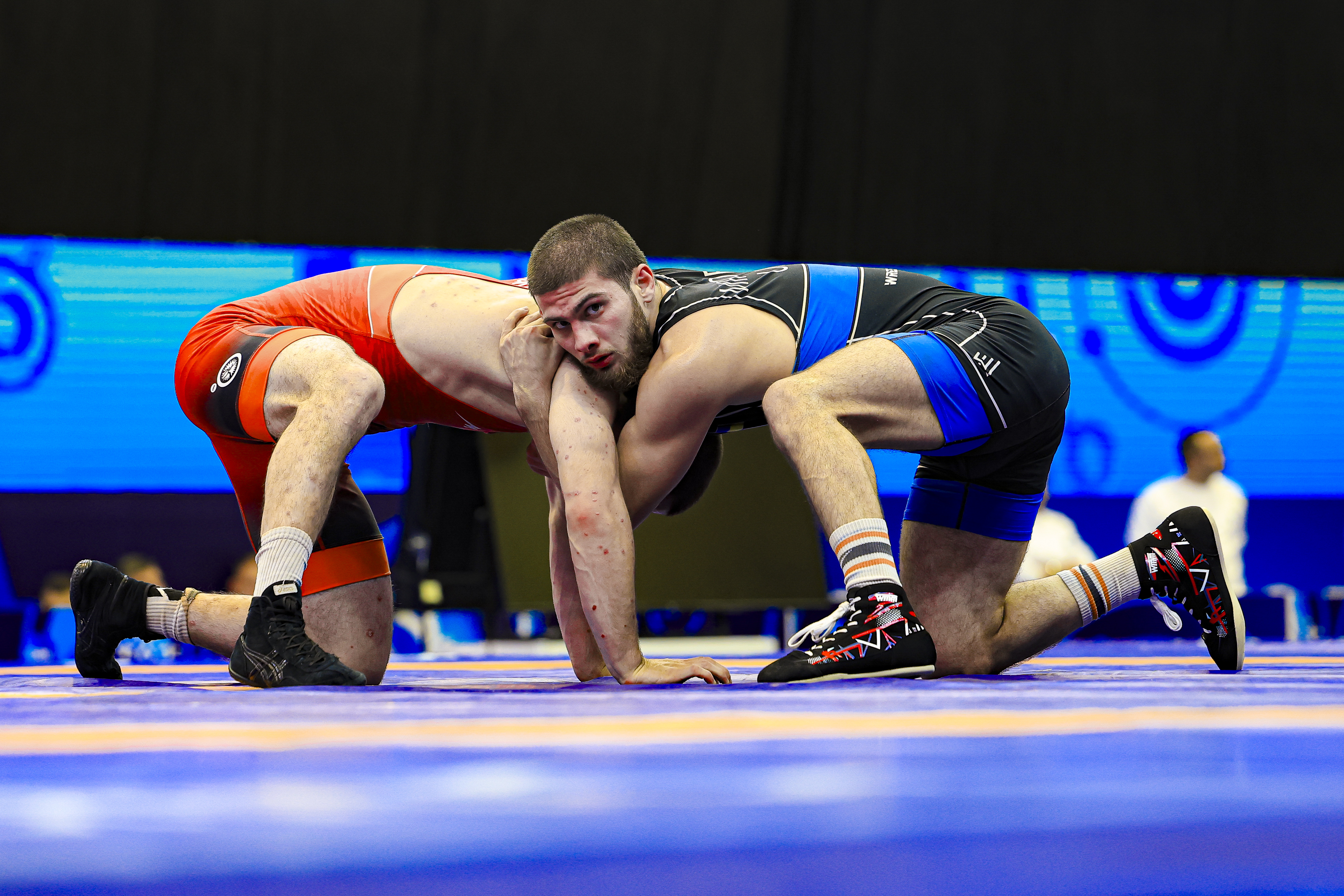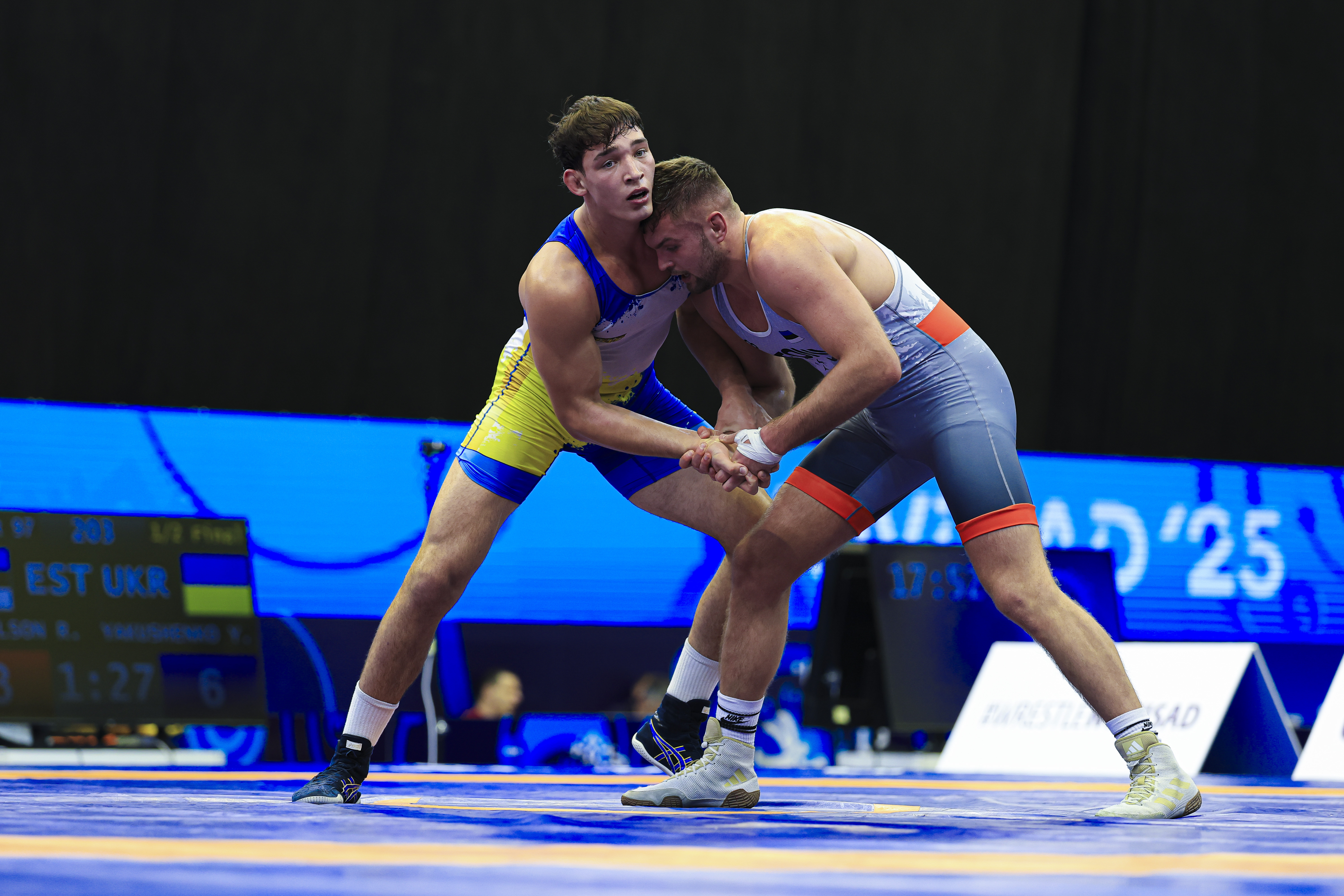'Tired' Olympic champ Kinjo gives way to blooming Sakurai
Saturday, June 17, 2023 - 09:54 By Vinay Siwach

TOKYO (June 17) -- The Meiji Cup witnessed another upset as Tsugumi SAKURAI triumphed over Risako KINJO (formerly Kawai) in the 57kg weight class, marking the third Olympic champion to be defeated in just two days.
While Mayu SHIDOCHI and Yukako KAWAI couldn't hold back their emotions after their losses, Kinjo took her 11-1 defeat on Friday in stride.
With a laugh, Kinjo remarked, "I'm tired."
For more than seven years, Kinjo has been a dominant force in women's wrestling, securing gold medals in Rio and Tokyo and claiming titles at the World and Asian Championships during this period.
However, after her victorious performance at the Tokyo Olympics, Kinjo entertained doubts about continuing in the sport. She contemplated whether her participation at 57kg was her final endeavor in that weight class. Over the course of two years, she got married, gave birth, and started raising a child, prompting her to question her future in wrestling.
"After the Tokyo Olympics, I thought 'was that my last for me at 57kg?'," she said.
Nevertheless, as the Paris Olympics approached, Kinjo found herself back on the mat, initially competing at 59kg before returning to 57kg with the aim of earning a chance to win her third consecutive Olympic gold medal.
"I am very happy to be able to again compete at the biggest domestic tournaments like the All-Japan [Meiji Cup]," she said. "It was my first time at 57kg since the Tokyo Olympics, and even though it's been a while, I had no problem getting down to the weight.
"This time, I had no breakdown in my condition and was in good shape. When I started wrestling as a child, I had never experienced not being in this sport and I had found out what it felt like. It made me realize how glad I am that I did wrestling."
Among the notable stars of Japanese wrestling, Kinjo stands out as one of the few athletes to defeat the four-time Olympic champion Kaori ICHO. Her remarkable career has solidified her status as a true legend in the sport.
So when Kinjo was asked about her loss to Sakurai in the 57kg semifinal, she offered a straightforward assessment.
"I have won two Olympic gold medals and I entered this tournament with a goal to win this and go to the Olympics," she said. "The effort you put as a two-time Olympic champion and to someone who has never been [is very different]. The feeling I had when I was going for the first time and the mindset was different. For someone going for the first time to the Olympics, it becomes everything in their life. For me, it's not."

Perhaps that's why she stepped aside for a while after the Tokyo Olympics. And it was only then that Sakurai could win the domestic competition and go to Oslo where she became the world champion in 2021.
So Saturday provided a perfect opportunity for Sakurai to establish herself as the best in Japan. She took the first step by overcoming Kinjo.
"I am younger, and I was determined to win," Sakurai explained.
Sakurai's triumph over Kinjo involved not only her performance on the mat but also meticulous preparation with her coaches. Soon after the draw in the morning, Sakurai realized that her path crossed with Kinjo's, and she understood that the moment had arrived. Her coaches reviewed Kinjo's previous matches, analyzing her techniques and providing instructions to Sakurai.
"I was not seeded," she said. "Before the match, my coach said that you are the world champion so go out and fight with confidence and she is the Olympic champion but believe that you are the strongest."
The pep talk seemed to ignite Sakurai's determination, as she began the bout aggressively, earning the activity point. She managed to get to Kinjo's legs multiple times, attempting to score a pushout as well. However, in one such scramble, Kinjo was awarded a stepout, putting her ahead with a 1-1 criteria lead.
During the break, Sakurai received another pep talk.
"After watching Kawai's other bouts, my coaches told me that she will attack from the second period so be careful," she said.
Sakurai turned the tide, launching her own attacks. She seized opportunities to attack Kinjo's legs and executed a leg lace. Kinjo defended against the first turn, but eventually succumbed, resulting in an 11-1 victory for Sakurai.
Although Sakurai had defeated Kinjo, her celebrations were somewhat subdued, as her achievement only secured her a spot in the Meiji Cup final. On Sunday, she would need to defeat Nanjo, who had previously bested her in the Emperor's Cup final in December. If successful, Sakurai would have to face Nanjo once again in a playoff on July 1 to secure her ticket to the Belgrade World Championships, in accordance with the rules set by the Japanese Wrestling Federation.
"If I don't win tomorrow, I can't go to the World Championships," she said. "There is still tomorrow. I want to win the title, the playoff and go to the World Championships."
According to the JWF rules, any wrestler who secures a medal in the Olympic weight classes at the World Championships earns an automatic spot on the Paris Olympics team. Failure to do so requires them to face the winner of the 2023 Emperor's Cup in another playoff whose winner will be dispatched to the Asian Olympic Qualifiers next year.
Considering the almost certain success of Japanese women wrestlers in winning medals at the World Championships, Kinjo's path to the Paris Olympics has become incredibly challenging. However, she confirms that she remains committed to wrestling.
"But my love for wrestling has not changed," she said. "I will continue to practice, thinking 'I can keep up one more time' with the younger wrestlers as I watch them make their mark."
For now, as the reigning Emperor's Cup champion in the 59kg weight class, Kinjo has the opportunity to compete in Belgrade. She can challenge the Meiji Cup winner at 59kg in a playoff on July 17. Kinjo intends to consider this possibility once things calm down.
"When things calm down, I will think [about 59kg]," she said. "There is not much time but I will talk to my coach and family and decide and set new goals. It would have made me look cooler if I had won here and aimed for Paris."


 Irfan MIRZOIEV (UKR) holds off Temuri ORJONIKIDZE (GEO) in the 77kg final. (Photo: United World Wrestling / Amirreza Aliasgari)
Irfan MIRZOIEV (UKR) holds off Temuri ORJONIKIDZE (GEO) in the 77kg final. (Photo: United World Wrestling / Amirreza Aliasgari) Yehor YAKUSHENKO (UKR) defeated Richard KARELSON (EST) in the 97kg semifinal. (Photo: United World Wrestling / Kadir Caliskan)
Yehor YAKUSHENKO (UKR) defeated Richard KARELSON (EST) in the 97kg semifinal. (Photo: United World Wrestling / Kadir Caliskan)
Share your thoughts.
Comments